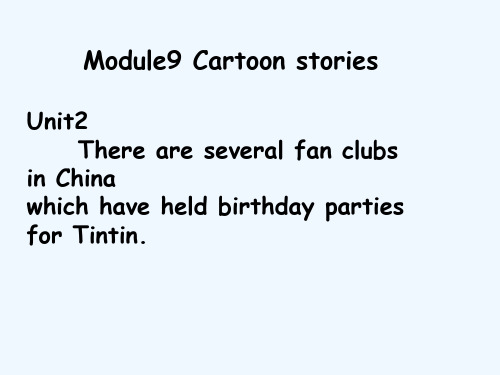九年级英语外研版上册教案:Module 9 Unit 2
- 格式:doc
- 大小:43.05 KB
- 文档页数:6






Unit 2 Will books be replaced by the Internet? 【教学目标】 Knowledge objective Key vocabulary—printing, development, trade, result, spread, introduction, amount, store, varied, form, connection, single, direction, replace, Key structures—look through, at a time, by hang, in a way, compare … to …, wait and see Ability objective To get information from the passage about the great inventions. To master the passive voice of the simple future tense. Moral objective 1. To arose Ss’ interest in learning about the great inventions. 2. To encourage Ss to be proud of our great country. 3. To develop the ability to cooperate with others. 【教学重点】 T o learn about some expressions in the passage. 【教学难点】 1. To get information from the article. 2. The use of the phrases. 【教学方法】 PWP method, task-based method 【教学手段】 A tape recorder, multimedia and some pictures 【教学过程】 Teaching Procedures: Step 1 Lead-in Look at the pictures and answer the questions. What did people use to remember something long long ago? Where did people start to write on about 2,000 years ago? What was invented in China during the Sui and Tang Dynasties? What was introduced to China in the twentieth century? Have you read books on the Internet? Step 2 Consolidate new words Look and say. The teachers shows the pictures of new words and let the students to say as soon as possible. Step 3 Consolidate new expressions Look at the pictures and say the expressions as soon as possible. Step 4 Pre-reading Work in pairs. Read the title of the passage in Activity 2.Discuss and make a list of the advantages of books and the Internet. Step 5 Listening Listen to Part 2 and answer the questions. 1. What does his mother do at home every evening? She looks through magazines. 2. When was paper first created? About 2,000 years ago. Step 6 Learning to learn To learn about how to find information quickly. Step 7Reading 1. Read the passage and match ideas with the paragraphs. a) The world before printed books b) The world after the invention of printing. c) Life with paper and printing d) Technology and books e) The future of books a-2, b-3, c-1, d-4, e-5 2. Read the passage and answer the questions. 1 What may become more powerful than printing? The Internet. 2 When was printing invented in China? During the Sui and Tang Dynasties. 3 When was the Internet introduced to China? In the twentieth century. Step 8 Complete the passage with the words in the box 1. Read the passage carefully. 2. Choose the right words to fill in the blanks. Step 9 Language points 1. Every evening, my mother looks through magazines at home. look through表示“快速阅读,浏览” e.g. I haven’t looked through the books yet.我还没浏览这本书。 2. As a result, there were not many book. as a result表示“结果”。 e.g. As a result, they got the cheapest TV set yesterday. 结果,他们昨天买到了最便宜的电视。 3. Books were only produced one at a time by hand. at a time表示“每次,一次”。 e.g. Please come in one at a time, not all together. 每次进来一个,不要一起进来。 by hand表示“用手(做)”。 e.g. All these toys are made by hand.所有这些玩具都是手工的。 4. Later, developments in printing made it possible to produce books more quickly and cheaply. development n. 表示“发展,进步” develop v. 发展,进步 e.g. With the development of our country, our life will become better and better. 随着我们国家的发展,我们的生活也会越来越好。 5. A much larger amount of information can be stored in more varied forms on the Internet than in books. amount n. 表示“量,数量” a large amount of表示“大量的” varied adj. 表示“各种各样的”,等于all kinds of。 e.g. There are a large amount of varied dresses and I don’t know what to buy. 这里有许多各式各样的裙子,我不知道该买哪个。 6. So what direction will traditional printing take in the future? direction n. 表示“方向” e.g. Tom went off in the direction of home.汤姆朝家的方向去了。 7. Will books be replaced by the Internet? be replaced by表示“被…代替”。 e.g. The old textbook was replaced by the new one. 旧的教材被新的代替了。 Step10 Writing 1. Read the sentences and notice how we give reasons and results. as a result as a result是一个固定短语,意为“因此,结果”,表示后面句子与前面句子所表达的内容构成因果关系,前面是因后面是果。它与so可以进行转换。如: Tony got up late that morning. As a result, he didn’t catch the first bus. = Tony got up late that morning, so he didn’t catch the first bus. because because是连词,引导原因状语从句。because +句子可以直接回答以why开头的特殊疑问句。 e.g. I like playing basketball because it’s fun. —Why is Lily crying? —Because she can’t find her cat. 2. Now work in pairs. Ask and answer the questions. Write full sentences with as a result, because or so.